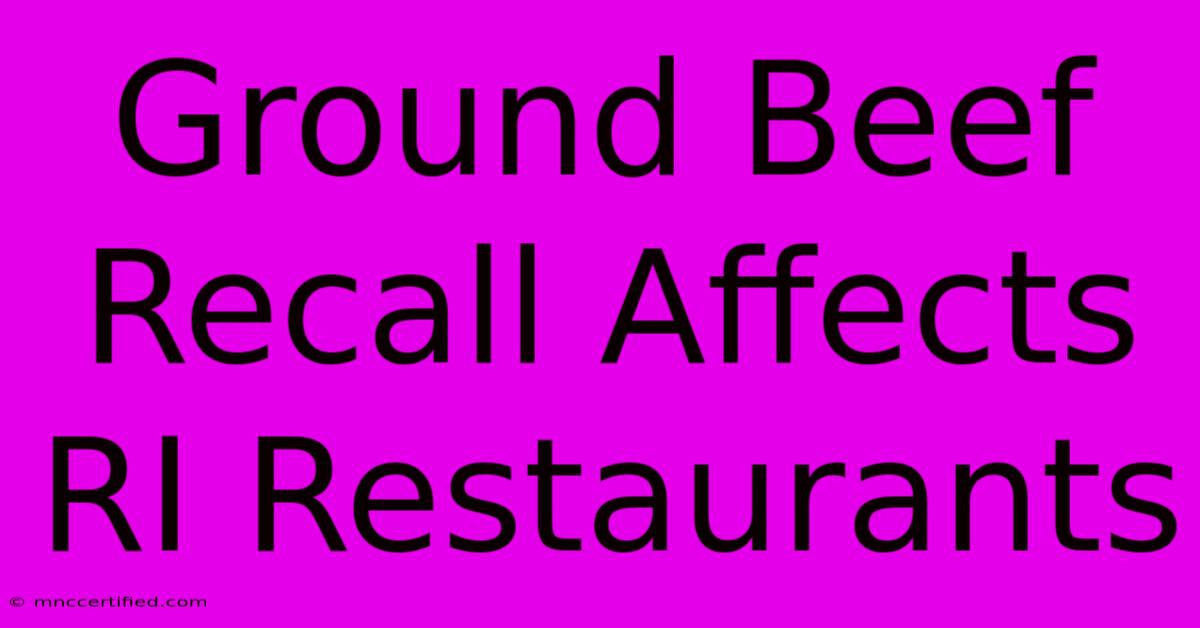Ground Beef Recall Affects RI Restaurants

Table of Contents
Ground Beef Recall Impacts Rhode Island Restaurants: What You Need to Know
Rhode Island restaurants are facing challenges following a recent ground beef recall. This article details the recall, its impact on the culinary scene, and what diners need to know to ensure food safety.
Understanding the Recall
A significant ground beef recall, issued by [Insert Company Name Here], has affected numerous restaurants across Rhode Island. The recall was prompted by [State the reason for the recall, e.g., potential E. coli contamination]. The recalled product is identified by [Clearly state the product details, including package labels, lot numbers, and sell-by dates]. It is crucial for restaurants and consumers to carefully check their ground beef supplies for these identifying markers.
Restaurants Affected
The recall's impact on RI's restaurant industry is substantial. Many establishments, ranging from small, family-owned diners to larger chains, have been forced to remove the affected ground beef from their menus and potentially discard existing stock. This disruption leads to several challenges:
- Menu Changes: Restaurants are scrambling to adjust their menus, substituting affected dishes or temporarily removing popular items. This can impact customer satisfaction and revenue.
- Supply Chain Disruptions: The recall highlights the fragility of the food supply chain. Restaurants are experiencing difficulties sourcing alternative ground beef supplies, adding to the pressure on already-stretched resources.
- Financial Strain: Discarding spoiled inventory represents a significant financial burden for many restaurants, especially smaller businesses with limited reserves.
Protecting Yourself and Your Business
For Restaurants:
- Immediately Check Inventory: Thoroughly review all ground beef stocks to identify any recalled products.
- Follow Recall Instructions: Adhere strictly to the recall guidelines provided by the manufacturer and relevant health authorities. This includes proper disposal methods.
- Inform Your Customers: Transparency is key. Communicate clearly with your customers about the recall and any menu adjustments. This will help maintain trust and avoid negative publicity.
- Contact Your Supplier: Discuss the situation with your supplier to understand the scope of the problem and the availability of replacement products.
- Consult with Local Health Officials: Reach out to the Rhode Island Department of Health (RIDOH) for guidance and support.
For Consumers:
- Check Your Refrigerator: If you recently purchased ground beef from the affected batch, immediately check the product packaging for the recall details.
- Do Not Consume: If you have the recalled product, do not eat it. Return it to the store for a refund or dispose of it properly.
- Monitor Your Health: If you have consumed the recalled product and experience symptoms such as diarrhea, vomiting, or fever, consult your doctor immediately.
- Report Issues: Report any concerns regarding the recalled product to the RIDOH or the manufacturer.
The Larger Picture: Food Safety and Restaurant Operations
This recall serves as a reminder of the importance of robust food safety protocols within the restaurant industry. Regular inventory checks, proper storage procedures, and employee training on food safety best practices are vital in preventing future incidents. The recall underscores the need for greater transparency and communication between manufacturers, distributors, and restaurants to ensure swift and effective responses to potential food safety issues.
Furthermore, this situation highlights the vulnerability of the restaurant sector to supply chain disruptions. Resilience requires diversification of suppliers, strong relationships with vendors, and flexible menu planning.
By learning from this experience, Rhode Island's restaurants can strengthen their operations and better protect their customers and their businesses. Staying informed and proactive is critical for navigating these challenges.
Keywords: Ground beef recall, Rhode Island, RI restaurants, food safety, E. coli, food recall, restaurant industry, supply chain, food contamination, RIDOH, restaurant operations, menu changes, inventory management.
(Note: Remember to replace the bracketed information with the specifics of the actual recall. This article provides a template; you need to tailor it with accurate and up-to-date information.)

Thank you for visiting our website wich cover about Ground Beef Recall Affects RI Restaurants. We hope the information provided has been useful to you. Feel free to contact us if you have any questions or need further assistance. See you next time and dont miss to bookmark.
Featured Posts
-
Louisville Ky Business Insurance
Nov 22, 2024
-
Icc Warrants Mc Cauls Strong Condemnation
Nov 22, 2024
-
Rooney Coleen A Tv Ratings Showdown
Nov 22, 2024
-
No 1 Qb Bryce Underwood Joins Michigan
Nov 22, 2024
-
Boba And Toast At Hey Bobo Cafe
Nov 22, 2024